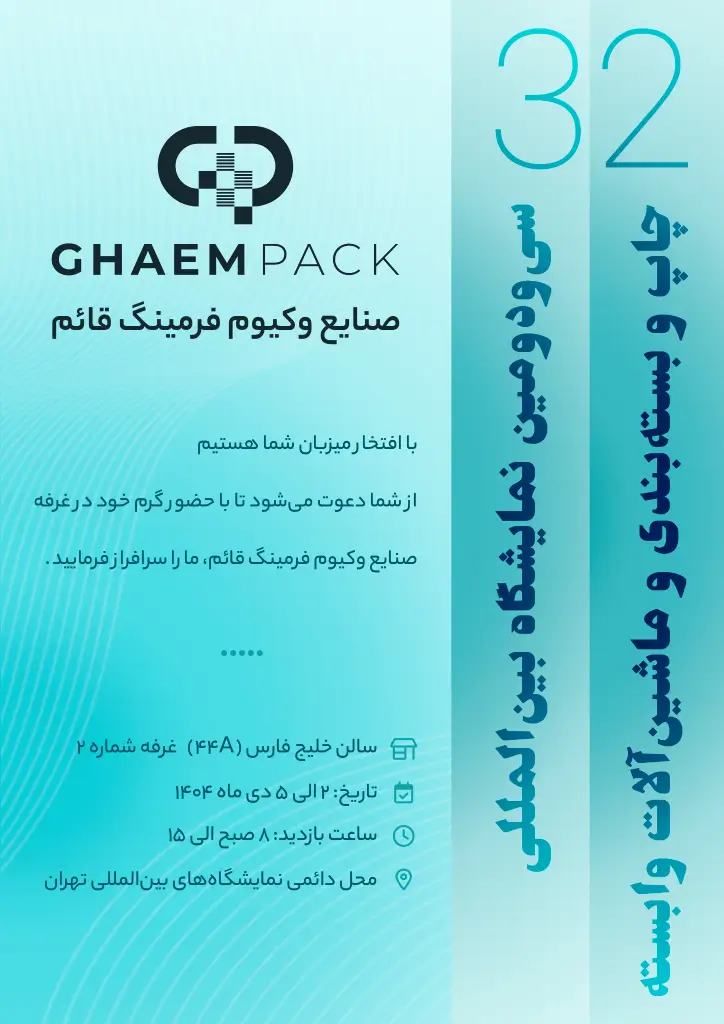years of work experience
Number of employees and staff
Number of customers
Number of completed projects
Why ghaem vacuum forming
Ghaem Vacuum Forming Industries has been operating since 1991 and has more than 30 years of brilliant experience in the field of vacuum forming packaging and, thank God, is one of the leading companies in Iran.
Ghaem Vacuum Forming Industries has consulting, design, molding, production and assembly units and a machine building unit. It is safe to say that our collection is one of the most complete collections in the field of vacuum forming packaging.
Ghaem Vacuum Forming Industries always uses advanced and up-to-date equipment and machinery, to always be one step ahead of its competitors! 🙂
The staff and employees of our complex in all units are experienced and experienced professionals who have been working with us for many years.
Introduction to Ghaem Vacuum Forming
The best have trusted us
Our Portfolios
Our Products
Vacuum forming packaging process
-
1
Advice and product reviews
First, the product is examined to determine its dimensions and size.
-
2
Vacuum sheet type
According to the product and the customer's needs, the type of sheet and its thickness are determined.
-
3
Mold design and construction
The vacuum forming mold is made with a CNC machine to shape the sheet.
-
4
Preparing the vacuum device
The mold is made and the vacuum sheet is installed on the vacuum machine to start the production process.
-
5
Production of vacuum packaging parts
After preparation, the production and shaping of the sheet begins with a vacuum forming machine.
-
6
Product assembly
After producing the vacuum part, according to the type of packaging, pressing, cutting and drilling and assembly are done.
FAQ
Vacuum forming packaging is a very cost-effective and efficient method, which is used for packaging various products such as cosmetics, toys, food, consumer goods, etc.
Vacuum forming or thermal vacuum forming process is used to produce vacuum packages.
In the simple definition of vacuum forming, it can be said that by using aluminum mold and air suction, the thermoplastic plastic sheet is formed and then cooled to take the shape of the mold.
Vacuum card: It is the most widely used type of vacuum packaging, and it is a combination of printed cardboard and vacuum piece. In this package, either the printed cardboard is placed between the vacuum piece or the vacuum piece is placed between the cardboard. And they usually make a hole in the top of the package that allows the product to be hung.
Frequency welding vacuum: In this type of packaging, after placing the product inside the package, two vacuum pieces are welded together by the machine to seal the package.
Sliding vacuum: In a sliding vacuum, the three sides of the main piece are bent, bent or folded with a machine, and then a cardboard or plastic card is slid inside the bent piece to complete the packaging.
Vacuum stand: This type of packaging is produced in two forms: ordinary stand and box stand. A typical stand is a piece in which the products are arranged and the box stand is placed inside a cardboard cube with a lid, then the products are placed inside the box.
Food containers: Containers with lids such as glasses and disposable containers and dairy containers whose lids are so-called flooded (sealed with a thin layer of aluminum) are other than this type of packaging.
Vacuum skin (thermopack): This type of vacuum packaging does not need a mold and in a way the product itself acts as a mold and forms the packaging. In the skin packaging, the products are placed on a cardboard card and then placed on the machine, and then the sheet is placed on the product and the vacuum card.
Special vacuum (with the possibility of printing): This package is like other vacuum packages, the only difference is the possibility of printing on it, which is done with special devices.
The raw materials for vacuum packaging are thermoplastics such as PVC, PET, HIPS and ABS.
Cosmetic products, toys, electronics, food, sweets and chocolates, consumer goods, etc. can be packed with vacuum forming.
In the old days, the casting method was used to make vacuum molds, but today, with the help of CNC machines, vacuum molds are made with 3D design and CNC machines.
DieCut boxes are made of PVC and PET sheets, which are cut and folded with special razors. It is possible to print on these boxes.




